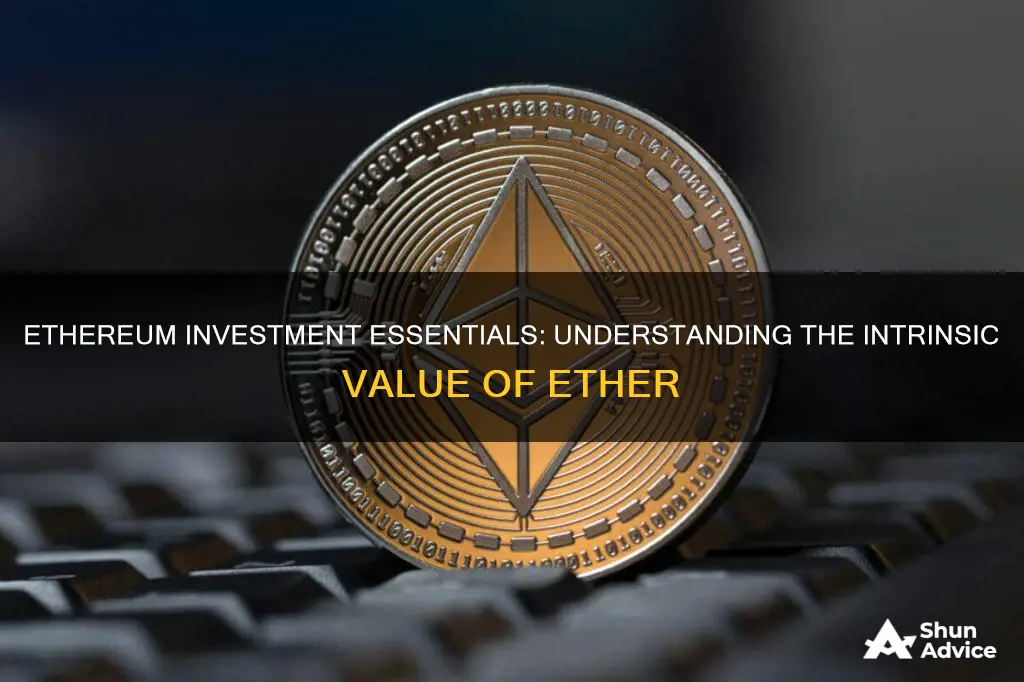
Ethereum is a blockchain platform that supports smart contracts and secure financial transactions. Its native cryptocurrency is called Ether (ETH).
Ether is one of the leading cryptocurrencies in the world, second only to Bitcoin. As of May 2024, Ethereum's market cap was $461.83 billion, with each token costing about $3,850.
If you're looking to invest in Ethereum, you'll need to sign up for an account on a crypto exchange platform, such as Coinbase, Kraken, Gemini, Binance, Bitfinex, or Bitstamp. You'll then need to fund your account, usually by depositing money from your bank account. Once your account is funded, you can start purchasing Ethereum.

Risk tolerance
Ethereum, like other cryptocurrencies, is subject to high volatility, with values fluctuating widely in a short period. This volatility can result in substantial gains or losses for investors. Therefore, it is imperative to assess your risk tolerance before investing in Ethereum. Understanding your emotional response to financial losses and considering your long-term goals are vital components of evaluating your risk tolerance.
The high volatility in the crypto market, including Ethereum, stems from various factors. One key factor is the influence of market sentiment. Positive market sentiment attracts more investors, driving up the price, while negative news or security breaches can lead investors to exit their positions, causing a decline in price. Additionally, the regulatory landscape surrounding cryptocurrencies is relatively new and uncertain, impacting Ethereum's price movement. Changes in regulations, such as crypto trading restrictions or bans, can significantly affect ETH prices.
Another critical factor influencing Ethereum's volatility is competition from other blockchains. Rival chains like the Solana Blockchain offer similar transaction capabilities as Ethereum but with lower fees. This competition can draw developers and investors away from Ethereum, reducing demand for Ether and negatively impacting its price.
When considering investing in Ethereum, it is essential to recognise that the crypto market is prone to extreme price volatility. This volatility necessitates a high-risk tolerance when investing in cryptocurrencies like Ethereum. It is advisable to invest only what you can afford to lose and to adopt a long-term investment strategy to mitigate short-term volatility.
In conclusion, understanding your risk tolerance is paramount when investing in Ethereum. The volatile nature of the crypto market and the various factors influencing Ethereum's price require investors to carefully assess their emotional and financial capacity for risk. By doing so, investors can make informed decisions about their level of investment and the strategies they employ.
Unveiling the Secrets of Buying Foreclosure Investments
You may want to see also

Crypto exchange
When buying Ethereum, you will need to use a crypto exchange. A crypto exchange is a platform that allows you to buy, sell, and trade cryptocurrencies. There are two main types of crypto exchanges: centralized and decentralized. Centralized exchanges are managed by a single organisation and are generally more user-friendly, whereas decentralized exchanges distribute responsibility for facilitating and verifying trades among users.
Some popular crypto exchanges include Coinbase, Kraken, Gemini, Binance, Bitfinex, and Bitstamp. These exchanges offer various features, such as low fees, a wide range of cryptocurrencies, and advanced trading tools. It is important to consider factors such as security, fees, and regulatory compliance when choosing a crypto exchange. Additionally, you may want to consider the type of exchange and its headquarters, license, and managing executives.
Once you have chosen an exchange, you will need to create an account and deposit funds. Most exchanges accept deposits via bank transfer or debit card. After that, you can start purchasing Ethereum and other cryptocurrencies. It is recommended to withdraw your cryptocurrency to a secure third-party wallet for safekeeping.
Fidelity's Investor Numbers
You may want to see also

Funding methods
Ethereum is a blockchain platform that supports smart contracts and secure financial transactions. Its native cryptocurrency is Ether. Ethereum is a decentralised platform that operates on a network of thousands of computers around the world.
There are several funding methods for investing in Ethereum. You can use a centralised exchange (CEX) or a decentralised exchange (DEX). A CEX is usually a business that stores user keys, provides order-matching services, and charges fees for its services. Examples of CEXs include Coinbase, Kraken, Gemini, Binance, Bitfinex, and Bitstamp. On the other hand, a DEX is a platform that connects users who rely on smart contracts to execute trades. Examples of DEXs include Uniswap and MetaMask.
You can also use payment platforms such as PayPal or Robinhood to buy Ethereum. It is important to note that cryptocurrencies are highly unregulated, so it is crucial to ensure the credibility of the chosen trading platform or exchange.
Another funding method is to apply for grants provided by the Ethereum Foundation and other organisations. The Ethereum Foundation's Ecosystem Support Program (ESP) provides funding and other forms of support to eligible projects working to improve Ethereum. ESP grants are separated into two categories: small grants (capped at $30,000) and project grants (with no specific funding cap). Other organisations offering grants for Ethereum-related projects include Moloch DAO, DAO Grants, and Academic Grants.
Lastly, you can also invest in Ethereum through brokerage accounts with platforms such as Robinhood, Interactive Brokers, or TradeStation.
Residential Investment Dividends: Unlocking the Payout Frequency Mystery
You may want to see also

Storage options
When you buy Ethereum, you are investing in a blockchain-based, decentralised computing platform that allows the execution of programs created on the Ethereum blockchain. Ethereum provides a network of thousands of "nodes" run by volunteers from across the world. This network of nodes forms a peer-to-peer system of user-operators who hold a portion of the overall data, creating a resilient file-sharing system.
Ethereum can be used as a decentralised storage system, particularly for code storage in smart contracts. However, it is not designed to store large amounts of data. As of March 2024, the Ethereum chain is around 500GB to 1TB, and every node on the network needs to be able to store all of the data.
Due to these constraints, a different chain or methodology is required to store large amounts of data in a decentralised way. There are several options for decentralised storage, including:
- Arweave
- Filecoin
- Skynet
- Storj
- 0Chain
- Crust Network
- Swarm
- 4EVERLAND
These platforms use either blockchain-based persistence or contract-based persistence. Blockchain-based persistence requires the whole chain to be accounted for when running a node, and new pieces of data are added to the end of the chain. This can become too large to upkeep and store all the data. Contract-based persistence, on the other hand, does not require all data to be replicated by every node and stored forever. Instead, it uses contract agreements with multiple nodes that promise to hold a piece of data for a period of time.
Another consideration for decentralised storage is the incentive structure. For blockchain-based persistence, there is a payment made to the validator when data is added to the chain. For contract-based persistence, there are agreements made with multiple nodes to hold a piece of data for a period of time, and these must be refunded or renewed whenever they run out to keep the data persisted.
Ethereum also uses a data structure called a trie to store data in a compact and efficient manner. There are three types of tries in the Ethereum blockchain:
- State Trie: This gets constantly updated and consists of a key and a value for every account in the Ethereum Account.
- Storage Trie: This is where the smart contract is present. A 256-bit hash of the storage trie's root node is stored in the global state trie as the storageRoot, and every Ethereum account has its own storage trie.
- Transaction Trie: Every Ethereum block has its own transaction trie, and the order of transactions in the block is determined by the miner who governs the block.
To retrieve data stored on the Ethereum blockchain, a request must be sent to an Ethereum node, which will then search its local copy of the blockchain for the requested data. Tools such as web3.js can be used to send a request and retrieve the data.
Dreaming of Wall Street
You may want to see also

Volatility
Ethereum is a blockchain platform that supports smart contracts and secure financial transactions. Its native cryptocurrency is Ether. Both Bitcoin and Ethereum are prone to extreme price volatility.
Ethereum's volatility can be attributed to its younger age compared to other cryptocurrencies. It was launched in 2014, five years after Bitcoin and three years after Litecoin. Ethereum's markets are very liquid, but its price appears to be quickly establishing itself.
Ethereum's technical indicators suggest mixed sentiments. For example, while the MACD for ETH/USD signals potential bullish trends in shorter time frames, the RSI indicates a pullback intensity below the 50 mark. These mixed signals reflect the ongoing challenges Ethereum faces in breaking through resistance levels and sustaining its recovery momentum.
Due to its volatility, investing in Ethereum requires a high-risk tolerance.
The Workforce Investment Act: Funding Education for America's Future
You may want to see also
Frequently asked questions
You are investing in the cryptocurrency Ether (ETH), which is the native currency of the Ethereum blockchain.
Bitcoin was designed to be a digital currency and an alternative to fiat currencies, whereas Ethereum is a blockchain platform that supports smart contracts and secure financial transactions. Ethereum's primary purpose is to serve as a platform for running decentralised apps, and its native cryptocurrency, Ether, is used to facilitate transactions on this platform.
The crypto market is highly volatile, and the price of Ethereum can fluctuate significantly. There is also the risk of fraud and hacking, as well as potential government regulations that could impact the value of your investment. It's important to do your research and only invest what you can afford to lose.







